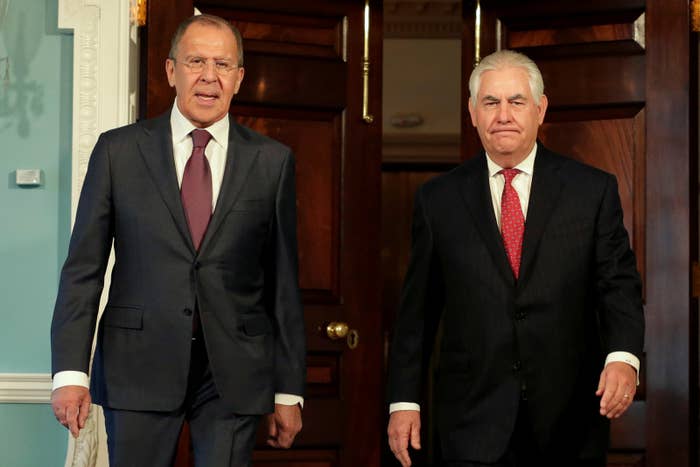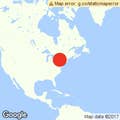
Russian Foreign Minister Sergey Lavrov is famous for injecting a touch of humor into high-profile diplomatic summits or press conferences — and Wednesday was no different, as he walked in front of cameras ahead of his meeting with Secretary of State Rex Tillerson at the State Department.
Reporters shouted questions about the long shadow cast over the talks by the stunning firing of FBI Director James Comey on Tuesday night. But as Tillerson hastily retreated from the spotlight, Lavrov turned to the press and played dumb.
“Was he fired?” Lavrov asked jokingly. “You’re kidding. You’re kidding.”
Despite Lavrov’s best efforts, no comedic intervention could lighten the mood surrounding one of the most awkwardly timed Russian diplomatic trips to Washington in recent memory.
The two men have a raft of important bilateral issues to discuss, ranging from the uptick in violence in Ukraine to piecemeal plans to resolve the civil war in Syria. But after President Donald Trump fired the man in charge of overseeing the FBI investigation into the Trump campaign’s contacts with Russian officials, any semblance of media interest in those issues was thrown out the window.
“Does the Comey firing cast a shadow over your talks?” NBC’s Andrea Mitchell yelled amid a flurry of similar questions as Tillerson quickly exited.
The State Department declined to comment about the Comey firing. One State Department official said it would be unusual to suspend diplomatic engagement with Russia for the sole purpose of avoiding bad optics. However, the official said the awkward timing of Lavrov’s meetings could not be overstated.
Last week, Russian President Vladimir Putin asked Trump if he could meet with Lavrov during a phone call, a person familiar with the conversation told the Associated Press.
Not shying away from the moment, the Russian Embassy in Washington tweeted out a photo on Wednesday of Trump meeting Russian Ambassador Sergey Kislyak.
Ambassador Kislyak and President Trump / Посол С.Кисляк и Президент Д.Трамп
The president’s critics immediately seized on the Lavrov trip, which included a White House meeting with Trump, as another sign of what they see as the Trump administration’s uncomfortably close ties with Russia.
But given the intense media and congressional scrutiny of US–Russia relations, the Trump administration likely lacks the space to maneuver a “grand bargain” with Moscow even if it wanted one. Trump had long sought to strike an ambitious agreement with Moscow that would resolve a range of long-standing issues between the adversaries, from security in Europe, to the fate of Syrian leader Bashar al-Assad, to a peace deal in Ukraine. In lieu of that, Washington and Moscow have readjusted expectations and limited the scope of potential cooperation to less ambitious endeavors.
"On Ukraine, the sides will discuss the need to stop the violence in eastern Ukraine and resolve the conflict through the full implementation of the Minsk agreements," the State Department said in a statement.
"On Syria, the secretary intends to discuss efforts to de-escalate violence, provide humanitarian assistance to the Syrian people, and set the stage for a political settlement of the conflict," the department added.
Those same issues dominated US–Russia relations during the Obama administration. The difference now is the backdrop of bitter accusations about Russian interference in the 2016 elections and the FBI and congressional investigations into potentially unlawful activity between Trump’s aides and Russian officials.
Following the meeting, State Department spokeswoman Heather Nauert said the two men discussed "the importance of defeating ISIS, de-escalating the violence in Syria, and ensuring that humanitarian assistance reaches hundreds of thousands of civilians throughout the country."
Meanwhile, Lavrov held a press conference at the Russian Embassy where he described the meeting as businesslike and free from the type of anti-Russian "ideology" that typified the years of the Obama administration.
Lavrov said he made progress with the US on an agreement to establish "de-escalation zones" in Syria, but the specifics of the plan were unclear.
“We have thoroughly discussed Syria, including those ideas about creating de-escalation zones," he said, noting that the idea of the zones first came from the Trump administration. "We have a shared understanding that this must be a step made jointly to put an end to violence in Syria."
He said Russia is interested in the US contributing to the security of the de-escalation zones.
When asked if Trump raised the issue of Russian meddling in the 2016 election, Lavrov said the issue did not come up. Showing signs of frustration, he dismissed the international media's focus on the subject as an "orgy."
"I never thought I’d have to answer questions like this," Lavrov said. "There is no need for [Tillerson] to tell us anything or give us assurance behind closed doors." He then challenged reporters to show proof that Russia interfered in the US election.
He also dismissed a question about Comey's firing, saying it wasn't the business of Russia to comment.
“This is not a question for me,” he said. “I can give you lots of examples when someone in the Russian Federation, France, or Britain hires or fires someone else. It’s your internal business.”

